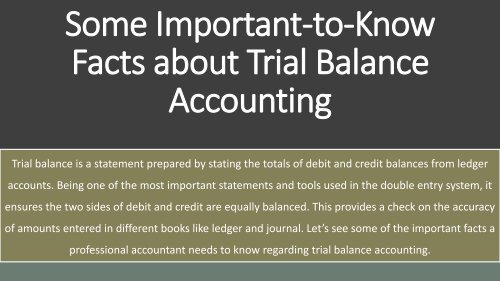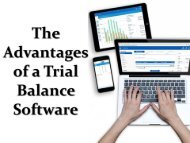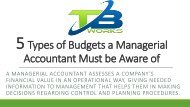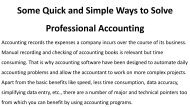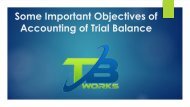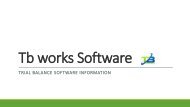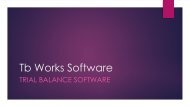Some Important-to-Know Facts about Trial Balance Accounting
Trial balance is a statement prepared by stating the totals of debit and credit balances from ledger accounts.Feel free to contact us for more details visit http://www.tbworkssoftware.com
Trial balance is a statement prepared by stating the totals of debit and credit balances from ledger accounts.Feel free to contact us for more details visit http://www.tbworkssoftware.com
Create successful ePaper yourself
Turn your PDF publications into a flip-book with our unique Google optimized e-Paper software.
<strong>Some</strong> <strong>Important</strong>-<strong>to</strong>-<strong>Know</strong><br />
<strong>Facts</strong> <strong>about</strong> <strong>Trial</strong> <strong>Balance</strong><br />
<strong>Accounting</strong><br />
<strong>Trial</strong> balance is a statement prepared by stating the <strong>to</strong>tals of debit and credit balances from ledger<br />
accounts. Being one of the most important statements and <strong>to</strong>ols used in the double entry system, it<br />
ensures the two sides of debit and credit are equally balanced. This provides a check on the accuracy<br />
of amounts entered in different books like ledger and journal. Let’s see some of the important facts a<br />
professional accountant needs <strong>to</strong> know regarding trial balance accounting.
Objectives<br />
Arithmetical Accuracy<br />
As stated trial balance statement is used the record the amounts of debit and<br />
credit sides and ensure they are equal on both their corresponding columns.<br />
If the amounts are matched, then it is assumed that the recordings in<br />
financial transactions are accurate. On the other hand, if there is any<br />
discrepancy found then it can be deduced that the amounts entered in the<br />
books are incorrect.
Locating <strong>Accounting</strong> Errors<br />
Extending the arithmetical objective in accounting, a trial balance also helps<br />
you in locating errors in the books such as journal and ledger.<br />
Summarize The Financial Statements<br />
A business performs a large of transactions throughout the year. But the raw<br />
transactions does not portray the current state of the business unless<br />
properly recorded and summarized. A trial balance caters the business in this<br />
case by summarizing the transactions from financial statements like <strong>Balance</strong><br />
Sheet, Income Statement, Cash Flow Statement, etc.
Provide The Basis For Preparing Final Accounts<br />
Final accounts shows the profit and loss of any business and its overall<br />
financial condition at the end of accounting period. These accounts are<br />
prepared by using the debit and credits figures from all the ledger accounts.<br />
In this way, the presence of trial balance statement helps in providing the<br />
needed figures for final accounts.
Methods Of Preparation<br />
A trial balance statement can be prepared by the following methods:<br />
1.Total Method<br />
Under the <strong>to</strong>tal method, the <strong>to</strong>tals of<br />
both the debit and credit figures are<br />
taken from ledger accounts.<br />
2. <strong>Balance</strong> Method<br />
Under the balance method, only the<br />
balances from ledger accounts are<br />
taken.
3. Compound Method<br />
A compound method is a combination of both the above defined methods.<br />
Therefore, this method is also known as <strong>to</strong>tal cum balance method.<br />
Normally, the balance method is preferred in creating trial balance<br />
statements. Under the trial balance, the transactions are either recorded in<br />
subsidiary or journal books. After that posting is done in the ledger and<br />
balances are concluded. Thus, the balance figures are used <strong>to</strong> prepare<br />
statement with the help of balance method.
Undetected Errors In <strong>Trial</strong> <strong>Balance</strong><br />
• Errors of Omission<br />
If a transaction is not recorded in the original books, then the transaction’s<br />
debit and credit effects will be omitted and no change on trial balance shall<br />
be seen.<br />
• Errors Of Commission<br />
Recording incorrect figures in original accounting books and then posting the<br />
same in ledgers.
• Compensating Errors<br />
This states that effect of one error is neutralized due <strong>to</strong> the effect of another<br />
error.<br />
• Errors Of Principle<br />
Whenever any expenditure or income is not properly accommodated with<br />
revenue and capital, the occurring mistake is called the error of principle.
TB Works Software<br />
Mail: info@tbworkssoftware.com<br />
Call: 832-387-7816<br />
Website:<br />
www.tbworkssoftware.com


